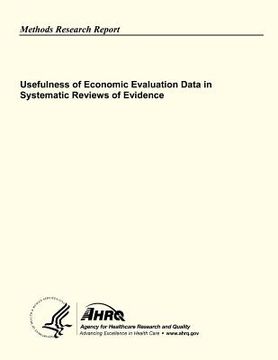Usefulness of Economic Evaluation Data in Systematic Reviews of Evidence (en Inglés)
Reseña del libro "Usefulness of Economic Evaluation Data in Systematic Reviews of Evidence (en Inglés)"
Many health care policymakers in the U.S. would like to make more use of economic data in reviewing new and existing medical interventions. Although much work is being done to evaluate the comparative effectiveness of medical interventions even this technique is not used extensively in policymaking. The U.S. has fallen behind international best practices in using economic data in the comparison of medical interventions for the purposes of policymaking. Systematic reviews of evidence offer opportunities to increase the use of economic data in the health policy process. Among the systematic reviews that have been conducted recently, there is great inconsistency in whether economic evidence is collected alongside clinical research data, the quality of the data collected, and the methods used to collect the data. In many cases, clinical research data may be sufficient for making decisions about adopting interventions. However, we need to explore and define better the information that is needed to guide those who are in charge of making requests for systematic reviews of evidence. More information is needed about: (a) when economic data might add to decisionmaking on top of the efficacy/effectiveness data presented in typical systematic reviews, and (b) if economic data are helpful, what methods should be used to include this information. Such information could guide future calls for systematic reviews of evidence. More information on best approaches for the inclusion of economic data alongside systematic reviews of clinical evidence will also benefit those responsible for producing systematic reviews. At present, many systematic reviews of evidence do not include economic evidence. Even if efforts are made to review the economic evidence, economic evidence often is insufficient to treat it in the same way that meta-analytic techniques can be applied to other pieces of evidence. Further, some economic evidence concerns primary data while other economic evidence is derived from more or less standardized and protocol-based approaches based on mathematical modeling. Investigators involved in performing systematic reviews need better guidance for making requests for economic evidence alongside other systematic reviews of evidence, with careful definitions of terms. This report has two aims. The first aim is to develop a conceptual framework for deciding when economic outcomes could provide policy-relevant information when included in systematic reviews of clinical outcomes. In the last of a series of works on grading of recommendations, the authors began a discussion about including resource use (a key input into costs and other economic considerations) in the grading of recommendations. When deciding on what to include in an economic evaluation component of a systematic review, the analyst needs a frame of reference. This report provides a conceptual framework that can guide the choice of perspective, the target or reference populations, and the assessment of generalizability. The framework also demonstrates how the interaction of these choices has important implications for the conduct of the analysis. The framework was developed by a multidisciplinary team that developed a draft framework and shared that framework with experts in cost-effectiveness analysis and public policy who reviewed and provided feedback before the framework was finalized. The second aim of this report is to define tradeoffs between incorporating previously completed "off-the-shelf" evaluations from the published or grey literature into systematic reviews, versus performing an explicit independent economic evaluation as part of a systematic review. The evaluation of the tradeoffs between the choices is based on theoretical and conceptual arguments, the availability of data, and nature of expected results.

